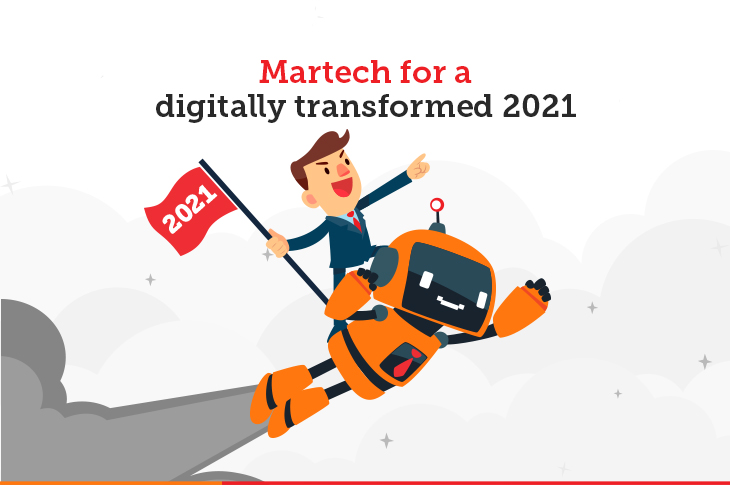Martech you need for a digitally transformed 2021

2020 has thrown a curveball with COVID-19 and the subsequent shutdown globally. With marketing budgets slashed, events canceled and the entire world grappling with the New Normal, CMOs had to rethink their marketing strategy and priorities to make the most of organic tactics and redefine their value chains to deliver optimum brand experiences. On the upside, there has been a greater focus on marketing and Martech (marketing technology) in this disrupted ecosystem. The pandemic has accelerated digital transformation initiatives and inspired organizations to invest in a new set of technologies to deliver value at speed. What will be the defining trends in martech to support this vision? Here’s our take on some of the key martech trends that will drive high impact and outcomes:
1.Intelligent Marketing
It is well-established that data is the new oil. Most organizations have a gold mine of data, but they don’t leverage it best. With the use of Artificial Intelligence (AI) and Machine Learning (ML), this data can be utilized to offer new insights, forecasts, and predictions that can go a long way in how you market to your customers.
Marketers can tap into Predictive Analytics to identify sales patterns for various groups of customers based on their buying history and predict future purchase patterns. Predictive Analytics also enables the creation of stronger campaigns that resonate with prospects better.
From AI retargeting, social media management, content distribution to chatbots and recommendation engines, AI is set to evolve more and grab a larger chunk of the martech pie.
2.Programmatic buying
With the advancement in AI and ML, programmatic advertising will continue to grow. Sophisticated ML tools help advertisers to target consumers with hyper-personalized and relevant ads. eMarketer predicts that programmatic digital display ad spends in the US alone will reach $80 billion by 2021.
The advantage of programmatic technology is that it becomes more intelligent with data and helps the system with recommendations such as the best time of the day, location, etc. for optimum ad performance. Thus, marketers have greater control over their campaigns, learn from customer behavior and the ability to improve outcomes incrementally.
3.Content Marketing Platforms
Content marketing platform or CMP is a software that helps marketing teams with the end to end management of marketing processes. With remote and distributed marketing team members, content marketing platforms are now more important than ever.
COVID-19 has certainly changed the way marketers reach their audience. As a result, many CMOs and marketing heads are now looking at tools that help build content more quickly and effectively. A CMP enables teams to centralize and streamline their upstream marketing process from planning to execution and approvals.
There are a variety of tools serving different needs. Their main purpose is to help enterprise teams become more efficient in the content management process by providing a single source of truth.
4.Measuring Campaign Attribution
Marketing teams use campaign attribution to study campaign influence. Since marketers work with multiple channels to execute their campaigns, offline and online, it presents unique challenges when it comes to measuring the impact of the campaign on ROI at various touchpoints.
Campaign attribution is an extremely useful tool in the modern marketer’s arsenal. Unfortunately, few know how to accurately calculate this impact. The right tools and processes can enable advanced attribution models that bring a number of benefits including better marketing spend, increased ROI, effective personalization, improved products, and optimized creatives.
5.Customer Data Platforms
Customer Experience is at the heart of all digital transformation initiatives. And data analytics help marketers to take the guesswork out of the equation. With the advent of advanced data-driven CX infrastructure, companies can deliver personalised and relevant products and experiences.
In recent years, the Customer Data Platforms (CDP) industry has witnessed unprecedented growth and interest in its capabilities to store data from a multitude of touchpoints. Many enterprise companies have launched their CDP offering and many small and big CDP vendors have emerged in 2020.
The CDP market will continue to grow and expand its feature-sets to help marketers analyse and activate consumer data.
6.Martech spend will rise
The new work-from-home economy has made collaboration and communication pivotal to the success of organizational initiatives. Like other functions, marketing depends heavily on technology to foster productivity and communication. A study from NewsCred suggests that 60% of marketing leaders are anticipating an increase in martech spend in 2021.
There will be greater spend on martech tools that enhance visibility, content production, content management, data management, and campaign creation.
To sum it up
The goal of martech is to ease the challenges of digital marketing in the VUCA(Volatility, Uncertainty, Complexity, and Ambiguity)world. In the rapidly evolving technology landscape, where hundreds of different software are created and released, it is important to align the martech stack with the organization’s overarching digital transformation goals.
Relevant links:
1.https://brandequity.economictimes.indiatimes.com/news/marketing/opinion-marketing-in-the-new-normal/77816818
3.https://scatter.co.in/content-marketing-and-cxos/
Contributors: Arundhati Dey and Swapnil Adsul
